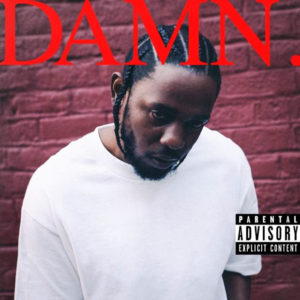
By Halley Freger
fregerha17@grinnell.edu
Last Friday, Kendrick Lamar released his fourth studio album “DAMN.” to overwhelmingly positive critical acclaim.
Lamar began making music as a teenager under the name K-Dot, exemplifying the beauty of the internet rap era where people independently release music and build communities around it online. Since then, he’s grown into a Grammy award-winning musician. In 2015, he released his third album “To Pimp a Butterfly,” an explicitly political project that refuses to shy away from difficult material, diving deeply into themes of racial inequality. In 2016, Lamar released “untitled unmastered.” The collection of demos was a surprising follow-up to the ambitious production of “TPAB,” but still ultimately shows off Lamar’s incredible lyrical abilities.
Lamar has now established himself as one of the biggest contemporary rappers, securing fame and wealth, and “DAMN.” explores this position within a larger societal and personal context. He confronts what it means to grow up in Compton, but then receive commercial success. “DAMN.” is an album that relies on juxtaposition and conflict. It’s an album where a song called “LUST.” can only be followed by a song called “LOVE.”
The album begins with haunting harmonies singing, “Is it wickedness? Is it weakness?” immediately addressing a common theme of the album. On “BLOOD.” Lamar harkens back to “To Pimp a Butterfly” with a spoken word style, his voice slightly muted while recounting a story over strings and flutes. He sounds like the narrator of a moody noir film as he tells a story of approaching a blind woman to help her, only to be shot. The gunshot is startling, creating a shift. A seemingly innocent interaction between Lamar, the narrator, and the woman turns violent, posing the question—why? Is it wickedness? Or is it weakness? What causes people to perpetuate or be complicit in acts of violence? The song ends with a Fox News clip in which the anchors discuss Lamar’s lyrics on police brutality. The sampled news clip points out the ridiculousness of people discussing his views, dismissing the real fear of racial violence. The clip serves as the perfect segue to “DNA.” where Lamar addresses the concept of blackness, not only analyzing his own personal experience, but the experience of being part of a larger community. He raps, “I got power, poison, pain and joy inside my DNA. I got hustle though, ambition, flow, inside my DNA.” The song bounces as Lamar showcases an impressive flow, barely pausing, each line packing a punch. Lamar finds pleasure in being part of a community, one that shapes experiences, but ultimately gives him a sense of pride, of “royalty,” and of the beauty of succeeding in the face of adversary. Throughout the album, he addresses his position within pop culture. He reveals insecurities, especially on the appropriately titled “FEEL.” He raps about feeling like “you wanna scrutinize how I made it,” exploring the irony of how he’s continuously denied access to his own success. The jazzy track is deeply personal, returning to themes of mental health in relation to fame introduced on “TPAB.”
When Lamar released the single “HUMBLE.” the response was mixed, not in terms of the undeniable musical and lyrical genius of the track, but because of one particular lyric, in which he critiques the popular media portrayal of women. With lyrics such as “show me somethin’ natural like ass with some stretch marks,” it’s understandable why many people, especially black feminists, were offended by the way Lamar continues to police women’s bodies for his own pleasure. While the critique is justified, perhaps this is a perfect example of the conflict Lamar presents throughout the album. He battles with temptation, to indulge in his success and desires, especially within the context of the modern, consumerist world. Perhaps the lyric in question reveals less of an attempt at equality and more of a somewhat shameful personal dilemma.
The album closes with “DUCKWORTH.” a continuation of the opening track, combining an old-school hip hop beat with a crooning Ted Taylor sample. He tells a story of his father Ducky and Anthony “Top Dog” Tiffith, the founder of Kendrick’s label TDE. Ducky showed kindness to Anthony while working at KFC, so when Anthony robbed the store, he choose to not shoot Ducky. Kendrick acknowledges that if it weren’t for this, he wouldn’t have achieved the success he has–his dad would be dead, Anthony would be in jail, and he would be stuck in a life of crime. This acknowledgement that he’s lucky to be where he is, is the motivation for “DAMN.” In the final moments of the album, it’s played quickly in reverse, returning to the opening line of the story on “BLOOD.” as if to say he must be humble, because, damn, what he has can be taken away at any second, with a single gunshot.
























































